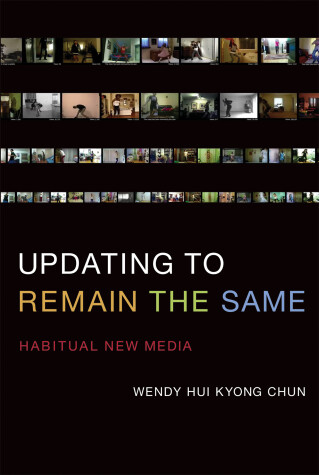The MIT Press
2 total works
What it means when media moves from the new to the habitual-when our bodies become archives of supposedly obsolescent media, streaming, updating, sharing, saving.
New media-we are told-exist at the bleeding edge of obsolescence. We thus forever try to catch up, updating to remain the same. Meanwhile, analytic, creative, and commercial efforts focus exclusively on the next big thing: figuring out what will spread and who will spread it the fastest. But what do we miss in this constant push to the future? In Updating to Remain the Same, Wendy Hui Kyong Chun suggests another approach, arguing that our media matter most when they seem not to matter at all-when they have moved from "new" to habitual. Smart phones, for example, no longer amaze, but they increasingly structure and monitor our lives. Through habits, Chun says, new media become embedded in our lives-indeed, we become our machines: we stream, update, capture, upload, link, save, trash, and troll.
Chun links habits to the rise of networks as the defining concept of our era. Networks have been central to the emergence of neoliberalism, replacing "society" with groupings of individuals and connectable "YOUS." (For isn't "new media" actually "NYOU media"?) Habit is central to the inversion of privacy and publicity that drives neoliberalism and networks. Why do we view our networked devices as "personal" when they are so chatty and promiscuous? What would happen, Chun asks, if, rather than pushing for privacy that is no privacy, we demanded public rights-the right to be exposed, to take risks and to be in public and not be attacked?
Drawing on the theories of Gilles Deleuze and Michel Foucault and analyzing such phenomena as Webcams and face-recognition technology, Chun argues that the relationship between control and freedom in networked contact is experienced and negotiated through sexuality and race. She traces the desire for cyberspace to cyberpunk fiction and maps the transformation of public/private into open/closed. Analyzing "pornocracy," she contends that it was through cyberporn and the government's attempts to regulate it that the Internet became a marketplace of ideas and commodities. Chun describes the way Internet promoters conflated technological empowerment with racial empowerment and, through close examinations of William Gibson's Neuromancer and Mamoru Oshii's Ghost in the Shell, she analyzes the management of interactivity in narratives of cyberspace.
The Internet's potential for democracy stems not from illusory promises of individual empowerment, Chun argues, but rather from the ways in which it exposes us to others (and to other machines) in ways we cannot control. Using fiber optic networks -- light coursing through glass tubes -- as metaphor and reality, Control and Freedom engages the rich philosophical tradition of light as a figure for knowledge, clarification, surveillance, and discipline, in order to argue that fiber-optic networks physically instantiate, and thus shatter, enlightenment.

